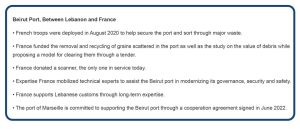
Rehabilitation of the Beirut port: France has honored its commitments to provide technical support. It is now up to Lebanon to take action. The ball is in its court.
All hopes are now permitted for a prosperous future for the Beirut port, especially since "a journey of a thousand miles begins with a single step," as the Chinese philosopher Lao Tzu said.
The French side, represented by French Ambassador to Lebanon Hervé Magro, has issued two deliverables to Lebanon regarding the rehabilitation strategy of the Beirut port, namely proposals for port organization and technical documents that will enable the launching of tenders for priority infrastructure works on one hand, and an assessment of port security including practical measures to establish security conditions at the Beirut port in accordance with international standards on the other.
The official handover of the two deliverables took place during a ceremony organized on Wednesday in the building housing the Central Administration of the Beirut port. Present at the ceremony were caretaker Prime Minister Najib Mikati, caretaker Minister of Public Works and Transportation Ali Hamiyeh and French Ambassador to Lebanon Hervé Magro.
Pragmatic Propositions
Thanks to French financing, and at the request of the Beirut Port Management and Operations Committee, two French engineering firms specializing in port infrastructure, Artelia and Egis, have developed a port rehabilitation strategy that favors a "pragmatic and realistic" approach. This is not just another study, but rather operational technical proposals that should allow for concrete progress: to rebuild damaged docks, streamline traffic within the port through a new traffic scheme and optimized zoning and solarize energy supply based on EDF's recommendations, thus achieving significant savings and revenue optimization.
During their brief presentation, the French experts emphasized "the objective of their pragmatic work, which was to identify the real needs of the port for better short-term operability without hindering long-term decisions regarding its reorganization."
Self-Financing
According to the caretaker Minister of Public Works and Transportation Ali Hamiyeh, the reconstruction of the Beirut port will be "self-financed," mainly through its revenues from customs duties and profits from its operation.
However, Hamiyeh emphasized that the door is wide open "to investors," both local and international, repeating the word "investors under the supervision of the Public Procurement Authority" several times. He clearly made a nod to the Director-General of the Public Procurement Authority, Jean Ellieh, who was present at the forefront of the audience.
In his speech, he recalled the constants of Hezbollah, the party to which he is affiliated, asserting in this context that state assets will remain its property.
It is worth noting, in this context, that the revenues of the Beirut port increased from a few thousand dollars in the aftermath of the August 4, 2020 explosion to over $150 million in the 2023 financial year. As for the number of containers handled, it reached 90,000 during the aforementioned period. Beirut Port handles about 70% of Lebanon's import-export flows and represents an important commercial tool for the country, with its revenues and profits able to finance not only the modernization of its operations but also the development of other public services. Unfortunately, currently, a container takes an average of 10 to 12 days to exit Beirut Port, compared to 3 to 5 days internationally.
The Silos
As Ambassador Hervé Magro pointed out, "The future of the silos area has not been addressed by French experts, given its memorial importance to the Lebanese."
For the French diplomat, "Today's ceremony is not an end in itself." Much work remains to be done. The next steps require progress on several points. First, clearing the port to secure and make available the area to be rehabilitated. Then, securing the necessary funds for the work. Finally, clarifying the legal and regulatory framework to modernize port activity and thus attract more private actors.

All hopes are now permitted for a prosperous future for the Beirut port, especially since "a journey of a thousand miles begins with a single step," as the Chinese philosopher Lao Tzu said.
The French side, represented by French Ambassador to Lebanon Hervé Magro, has issued two deliverables to Lebanon regarding the rehabilitation strategy of the Beirut port, namely proposals for port organization and technical documents that will enable the launching of tenders for priority infrastructure works on one hand, and an assessment of port security including practical measures to establish security conditions at the Beirut port in accordance with international standards on the other.
The official handover of the two deliverables took place during a ceremony organized on Wednesday in the building housing the Central Administration of the Beirut port. Present at the ceremony were caretaker Prime Minister Najib Mikati, caretaker Minister of Public Works and Transportation Ali Hamiyeh and French Ambassador to Lebanon Hervé Magro.
Pragmatic Propositions
Thanks to French financing, and at the request of the Beirut Port Management and Operations Committee, two French engineering firms specializing in port infrastructure, Artelia and Egis, have developed a port rehabilitation strategy that favors a "pragmatic and realistic" approach. This is not just another study, but rather operational technical proposals that should allow for concrete progress: to rebuild damaged docks, streamline traffic within the port through a new traffic scheme and optimized zoning and solarize energy supply based on EDF's recommendations, thus achieving significant savings and revenue optimization.
During their brief presentation, the French experts emphasized "the objective of their pragmatic work, which was to identify the real needs of the port for better short-term operability without hindering long-term decisions regarding its reorganization."
Self-Financing
According to the caretaker Minister of Public Works and Transportation Ali Hamiyeh, the reconstruction of the Beirut port will be "self-financed," mainly through its revenues from customs duties and profits from its operation.
However, Hamiyeh emphasized that the door is wide open "to investors," both local and international, repeating the word "investors under the supervision of the Public Procurement Authority" several times. He clearly made a nod to the Director-General of the Public Procurement Authority, Jean Ellieh, who was present at the forefront of the audience.
In his speech, he recalled the constants of Hezbollah, the party to which he is affiliated, asserting in this context that state assets will remain its property.
It is worth noting, in this context, that the revenues of the Beirut port increased from a few thousand dollars in the aftermath of the August 4, 2020 explosion to over $150 million in the 2023 financial year. As for the number of containers handled, it reached 90,000 during the aforementioned period. Beirut Port handles about 70% of Lebanon's import-export flows and represents an important commercial tool for the country, with its revenues and profits able to finance not only the modernization of its operations but also the development of other public services. Unfortunately, currently, a container takes an average of 10 to 12 days to exit Beirut Port, compared to 3 to 5 days internationally.
The Silos
As Ambassador Hervé Magro pointed out, "The future of the silos area has not been addressed by French experts, given its memorial importance to the Lebanese."
For the French diplomat, "Today's ceremony is not an end in itself." Much work remains to be done. The next steps require progress on several points. First, clearing the port to secure and make available the area to be rehabilitated. Then, securing the necessary funds for the work. Finally, clarifying the legal and regulatory framework to modernize port activity and thus attract more private actors.

Read more




Comments